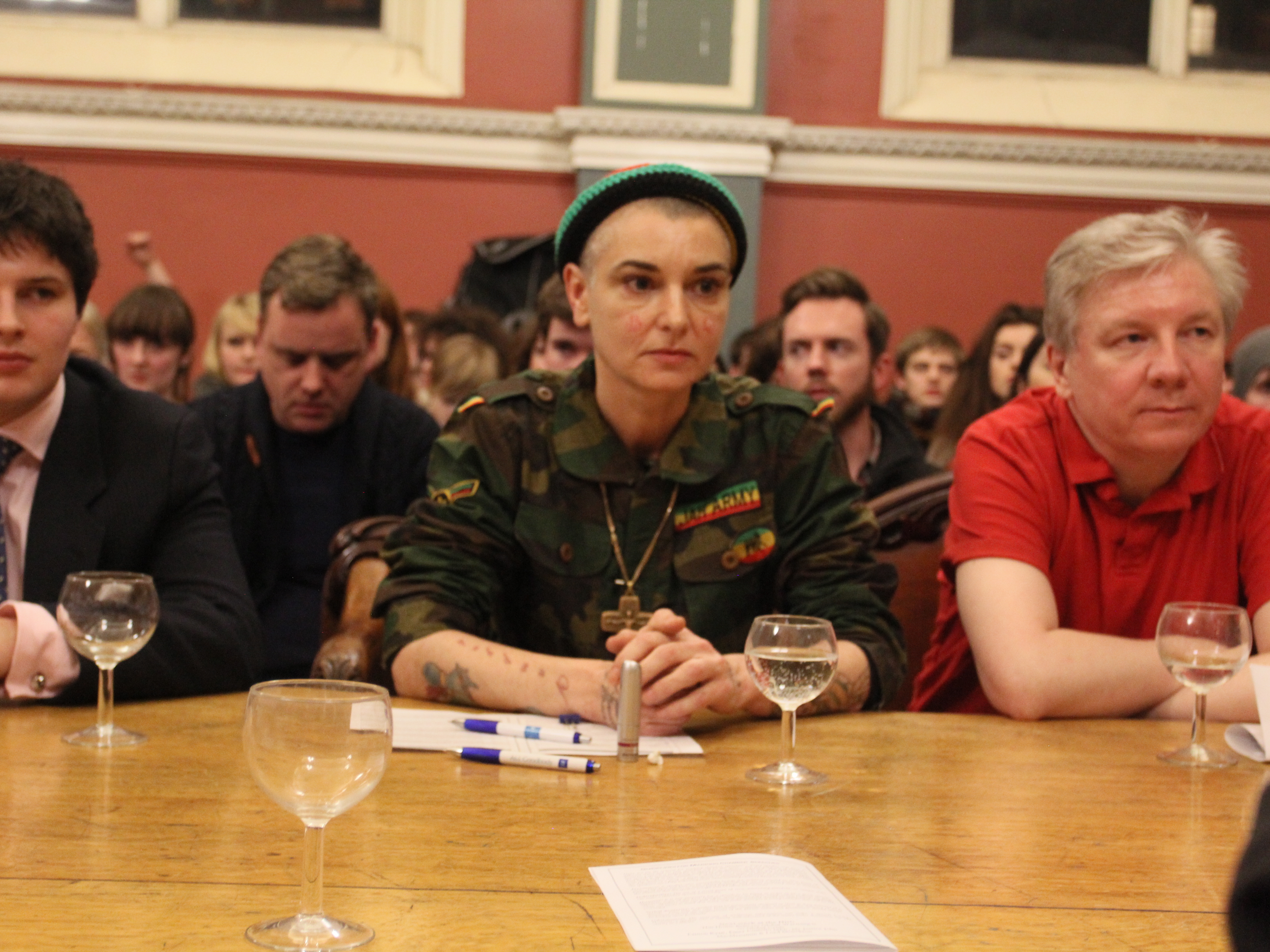Eva Short
Staff Writer
Sinead O’Connor, among an impressive line up comprising of students, seminaries, experts and politicians, took to the podium in the College Historical Society’s Debating Chamber last night. She was there to discuss the motion of the night, “That This House Believe the Catholic Church can be salvaged”.
Among the speakers were Cork Fine Gael TD Jerry Buttimer, who opened the debate. He spoke in defence of the Catholic Church while acknowledging that having to conceal his homosexuality had been difficult. “As a gay man” he prefaced one rebuttal to a member of the audience, going on to express admiration for Pope Francis and explaining the potential for the Catholic Church to change and develop, and that a “2000 year old” structure was both worth saving and had the potential to be saved.
Michael Nugent, playwright and chair of Atheist Ireland, responded to Jerry and the student speakers (Ciara O’Rourke, Siobhan O’Se, James Larkin) that had followed him by citing the “outrageous crimes and outrageous offences” that the Catholic Church had committed since its foundation. He referred to some surprising figures, explaining that surveys show that 75% of Roman Catholics don’t believe in transubstantiation, and that 8% don’t believe in God. Furthermore, he explained that as the Western world has develop, Catholics have either had to become more secularised as they rely more heavily on science and rationality, or become more fundamentalist and literal. He discussed the more literal, Biblical and superstitious approach to Catholicism seen in “The Global South”, stating “The Iona Institute reflect the Roman Catholic teaching around the world” In mentioning the Iona Institute, he also touched upon John Waters and the heated LGBT right debate taking place in the country in light of the law suit surrounding Panti Bliss/Rory O’Neill’s appearance on the Saturday Night Show last month. Speaking against the motion, Nugent summated by saying that with economic development, the Church’s influence will wain, and that this is an inevitable development.
Fr Tony Flannery, a priest who came into conflict with the Congregation for the Doctrine of Faith, explained that while his experience with the Catholic Church and their “16th century notion of justice” had left him disillusioned, he felt that the message of Jesus was worth protecting. If the Catholic Church became a body that could not embody this message or “the love of God”, it would be “empty and useless”. He deemed the institution “an obstacle to the message”, saying that regardless of whether the Church survives, “fundamental human questions” such as the meaning of life will still exist. Also referring to Pope Francis, he pointed out that “conservative cardinals nominated a radical man” in a move that is both unusual and promising.
Students Colm Finlay, Alexa Donnelly, and Darren Reilly spoke after Flannery, coming from both sides of the debate, before Sinead O’Connor stepped up to round off the evening. Wearing an army combat jumpsuit, a large and ornate brass crucifix, a Pride belt and a Rastafarian beanie over her shaved head, she pulled out a printed list of Bible quotes and warned listeners that she “didn’t write the books” and was ” just reading them” She discussed the ways in which “God has revealed himself through the scriptures”, explaining to the audience that the end of religion aligns with the message of Jesus, stating “God hates religion”. In her trademark raspy and muted voices, she referred to excerpts from Isaiah, among others and said that God had been “cockblocked” by those who deviated from the scripture. Picking up on the subject of child sex abuse that had arisen over the course of the debate, she referred to Matthew in saying “all the sins of man will be forgiven, all but one; blasphemy” and dubbed the sexual abuse of children by Catholic priests to be blasphemy. To a silent and rapt audience she finished her speech by explaining that the return of Christ is inevitable, and with that religion will have to end.
The debate engaged with issues of sociology, economics, philosophy and theology, demonstrating the many facets of human existence which the subject of religion bleeds into. After a quick vote put to the audience, the motion “That This House believes the Catholic Church can be salvaged” was rejected.






